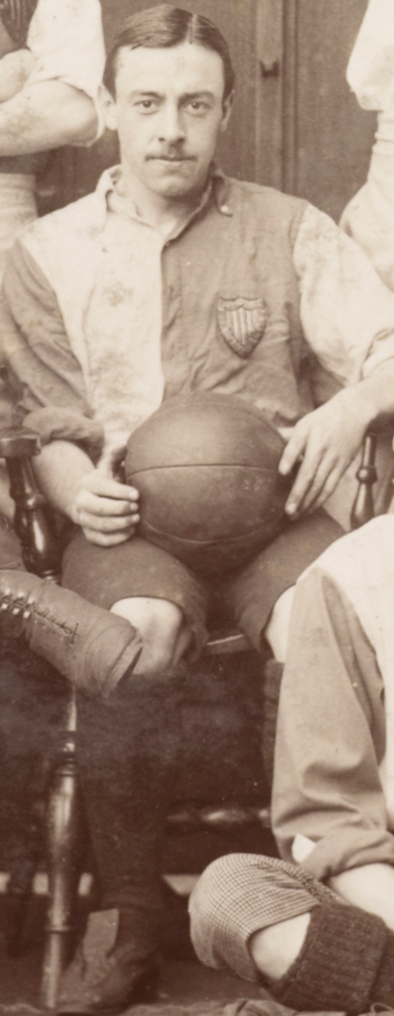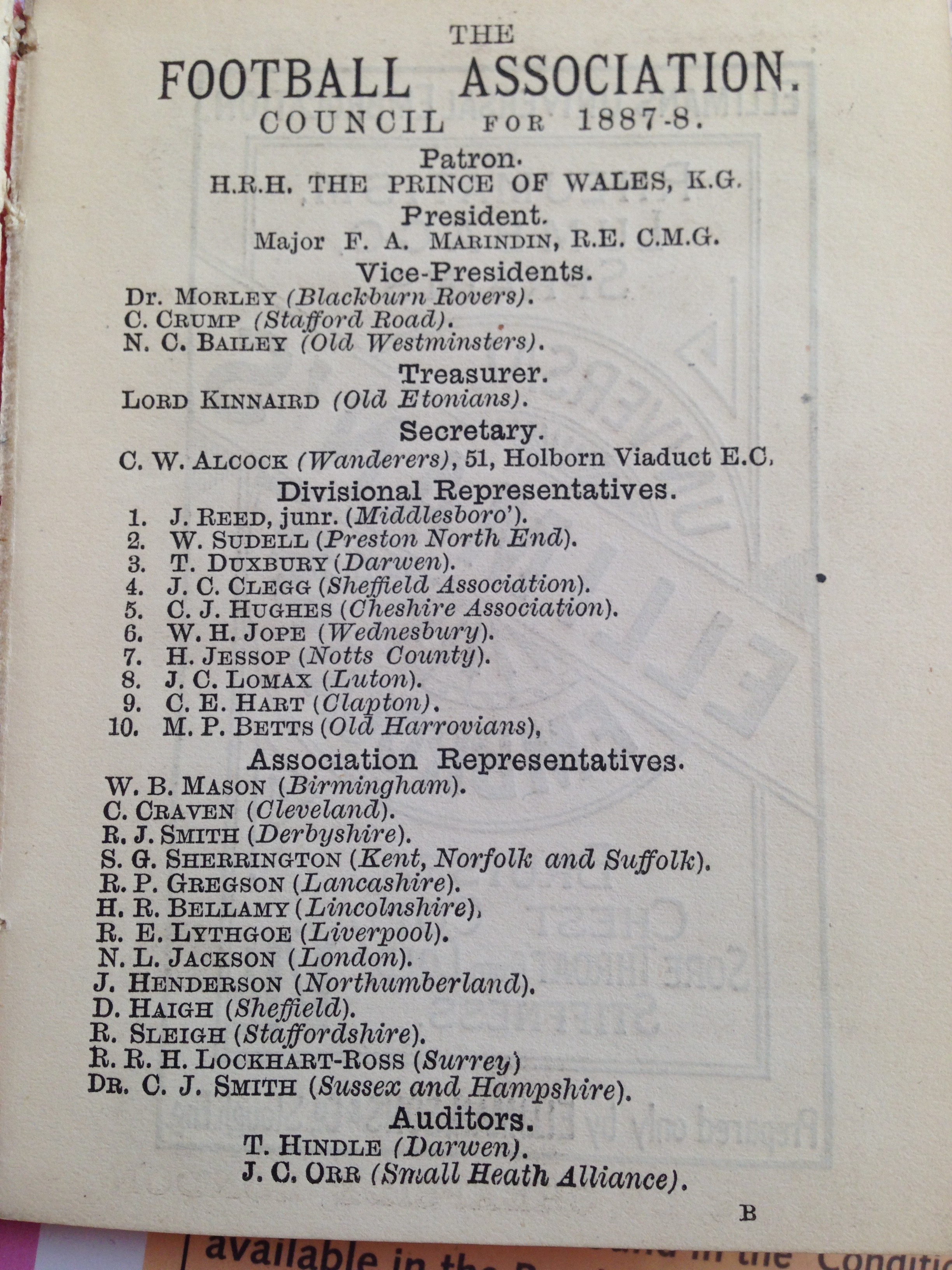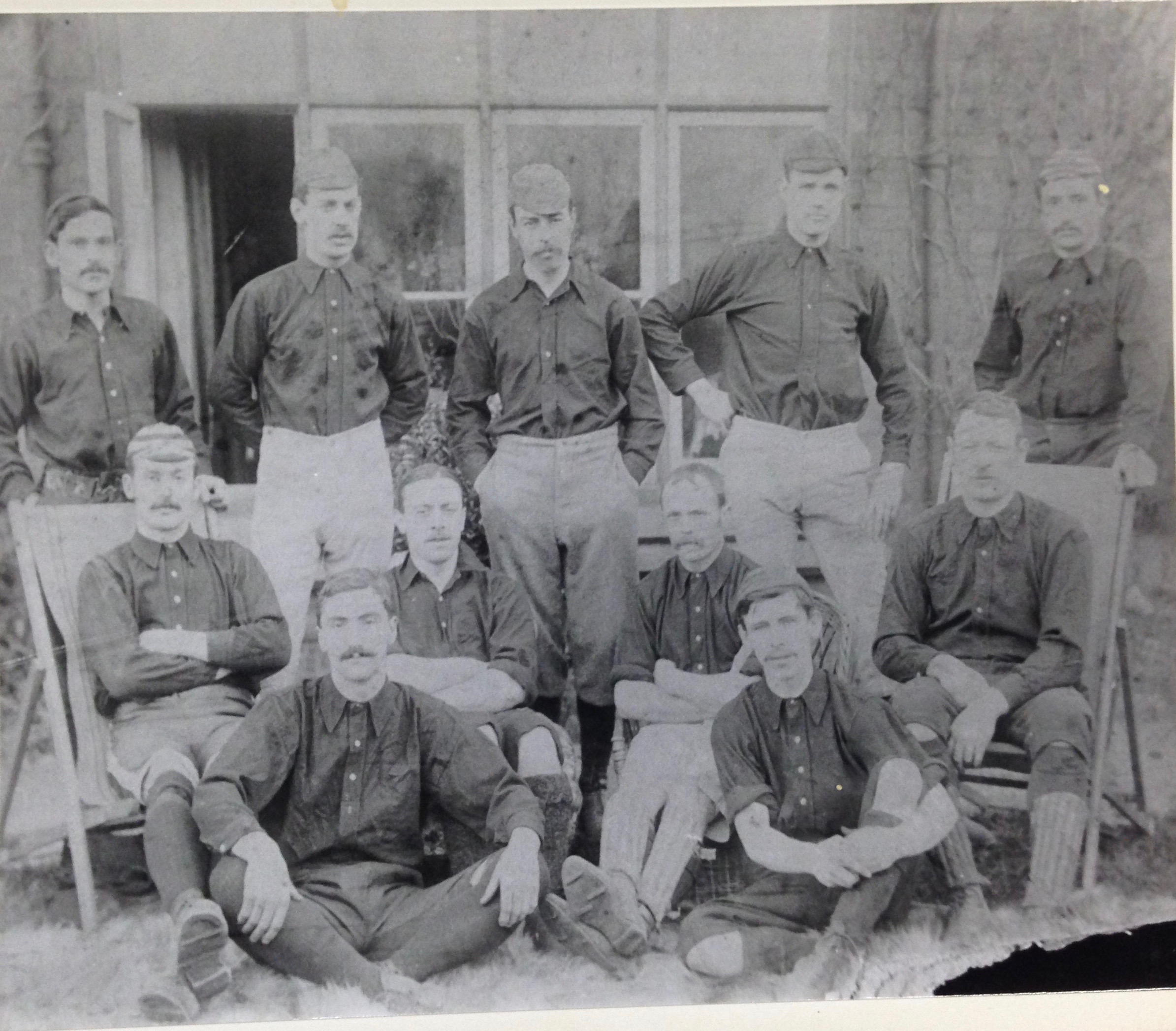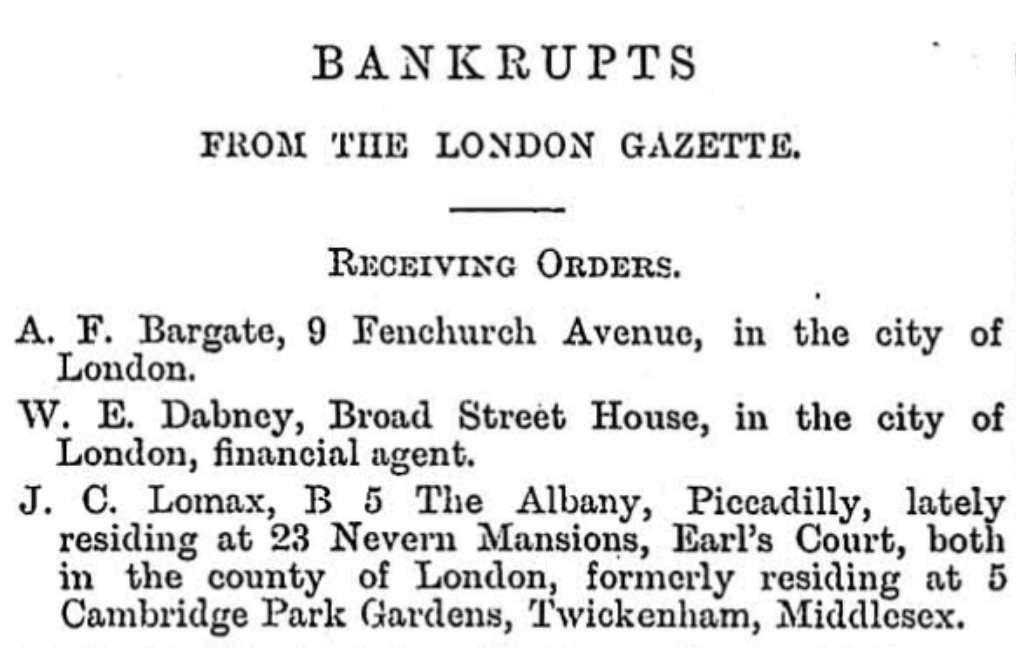John Charles Lomax
J.C. Lomax was born on the 22nd October 1864 at Sale, Cheshire. In 1871 he was living with his wealthy parents, John Lomax senior and Mary Ann Lomax at “Springfield House”, Bury. The family had four servants including one nurse. John senior is described in the census as a retired cotton spinner. As J.C. was named after his father, as is the Victorian tradition, he was known by his middle name, Charlie.
J.C.’s mother died in 1875 aged just 35. His father sold the house and moved to Bayswater, London,. J.C. (photographed left in his Peterhouse kit) and his brothers, E.H. and D.A.N. and his sister Beatrice Eugenie were all sent to boarding school.
The boys were all sent to St. John’s College, Luton and they all appear there on the 1881 census. The college excelled at football and rugby and J.C. played both as well as cricket in the summer. J.C. was noticed by the two major teams in the town, Wanderers and Excelsior. A pacy winger with outstanding dribbling skills, J.C. chose to play for the Wanderers. He was elected onto the board of the regional football association, the East Midlands Counties Football Association (E.M.C.F.A.) which formed in 1884. Under the E.M.C.F.A he represented Bedfordshire on the pitch many times. He met the best players from the region and persuaded many to come and play for Luton Town, such as the Bower brothers from St. Neots and the legendary Arthur H. Taylor of Bedford.
J.C., around five foot tall, formed a partnership on the left wing with the equally diminutive George Deacon. The “little ‘uns” as they were known terrorised many defences and launched Luton Wanderers into the position of premier club in the town. Relations with Luton Excelsior were good and 1883 a combined team beat Newport Pagnell away – a remarkable result. George Deacon later said that this victory gave him the idea of a “Town Club” made up of all the best players. Perhaps because some foresaw the break-up of all other clubs at the expense of a Luton Town Football Club, Deacon’s vision did not materialise smoothly.
After Herbert Spratley and his co-conspirators arranged a secret meeting and changed the name of the Luton Wanderers to Luton Town (see Chapter 5), there were rumours J.C. would leave them. There is one report of a game in which the writer hopes that J.C. will never leave the Wanderers. Fortunately, J.C. did not walk away from the issue but decided to take action. It is clear that J.C., Deacon and many others disapproved of Spratley’s way of forming a Town Club. J.C. was first to speak at the meeting called on 11th April 1885 at Luton Town Hall. His speech was summarised by the Luton Reporter;
“Mr J.C. Lomax was called upon to give his opinion upon the proposed formation of a Town Club, said he was most emphatically in favour of a proposed Luton Town Football club, not, however, for the breaking up of any other club. The reasons he advanced were that the proposed club would give more scope to find out who were really the best players to play in the town matches: it would give them more opportunity of showing what they were as football players; and it would form a good club for the training of young players, who could thus work up to play in the town matches. He could not quite see any objection to the proposal, because it would do away with all that petty feeling which had hitherto existed. Taking all these points into consideration, he might say he was very emphatically in favour of the establishment of a club which could really be called the Luton Town Football Club.”
As J.C. was the first person called upon to speak by the Chairman, we can reasonably assume that he was one of the major instigators of the meeting. They won the day and the Luton Town Football Club was formed (see Chapter 6 for the full story of this meeting). His vision of giving the young players in the town the opportunity of showing what they were as football players was fulfilled as in the first season the club would try out 55 players. The reputation the club has today for giving players a chance and developing them can be directly traced to J.C. Lomax’s vision of 11th April 1885. It was appropriate that J.C. scored the first ever Luton Town goal in October 1885 against Higham Ferrers.
J.C. had gone to study at Peterhouse at Cambridge University on 1st October 1884. However, he was one of those students who used University as a means to play as much sport as possible. He played football and rugby for Peterhouse which impinged on his Luton Town appearances. He also played lawn tennis and cricket in the Summer for Peterhouse, Luton Town and any other team that would invite him. Although in 1886 he said that Luton Town would have first call on his services he did play for St. Albans on a number of occasions at the expense of the Straw Plaiters. He spread himself too thin and failed to turn up for a number of games when picked to play.
He was a quiet, generous man who treated the working class men of the town with the greatest respect, and he received respect in return. It was in his manner not to appeal for fouls, even bad ones against himself. It was a peculiar feature of the Victorian Gentleman that it was bad form to ask for a free kick. The implication was that a gentleman did not need the help of a third party such as the referee or umpire. The Luton Reporter said the following about him in the January 1888 game against Hanover United;
“Several times a foul ought to have been claimed by J.C. Lomax, but his generous disposition forbade him noticing it.”
His unbounded generosity is demonstrated at an F.A. Cup tie at Maidenhead in 1889. Frank Pitkin, the committee member, mentioned to J.C. the benefits of insuring the team against accident on the field. J.C. Lomax immediately gave Pitkin £6 towards the cost of the insurance. The University records show that J.C. left Peterhouse without any qualifications. When E.H. graduated with a B.A. at Christmas 1887, J.C. left too.
Having served on the board of the E.M.C.F.A. the Luton Times reported that on Monday the 26th September 1887;
“at the general meeting of the English Association held in London on Monday, Mr J.C. Lomax, of the Luton Town Club, was elected to represent the division which included Bedfordshire, on the Council of the Association. There were two other gentlemen nominated for the division, viz., Mr F. Sherrington, of Oxford University and Crusader Club, and Mr J.P. Rowlinson of Cambridge University. This is an honour for the Luton Town Club, and no doubt Mr Lomax will prove as of good service on the Council as in the football field”.
This was indeed a great honour and shows that J.C. was a highly respected administrator as well as a footballer. The photo, left, demonstrates that J.C. was moving amongst the most powerful men in the F.A. Note that Lord Kinnaird is the Treasurer – J.C. met him when the Old Etonians (second team) played the Wanderers in 1884.
After a game against Old St. Paul’s on the 14th April 1888 J.C. presided over a smoking concert. The Luton Reporter takes up the story and shows that J.C. could sing as well;
“Luton Town Football Club. – This club brought the seasons play to an end on Saturday, and the opportunity was taken by the committee to invite members to a knife and fork tea at Rudd’s Rooms in Bute Street, to which about 60 responded including the visiting team viz., Old St. Paul’s. The manner in which Mr Rudd catered for the company gave general satisfaction. After tea a very pleasant evening was spent, a smoking concert, under the presidency of Mr J.C. Lomax, being very successful. The following programme was gone through:- Pianoforte solo, Mr Baker; song, “Blind boy at play”, Mr G Smith; song, “Bill of fare”, Mr Wilson, London; song, “Wolf,” Mr Clark; song, “Selected”, Mr Taylor, London; song, “I really can’t keep still”, Mr J.C. Lomax; song, “Wrong Un’s”, Mr H Shane; song, “I went with him”, Mr C Randall; song, “Old Brigade”, Mr Hunt; song, Last, last man”, Mr Nolleth, London; song, Masher king of Piccadilly”, Mr Wilson, London; song, “Veteran”, Mr Bennett; song, “So it was”, Mr Rally; song, “Hear it”, Mr C Randall; song, “Love”, Mr Squires, London; recitation, Mr Lindsay, London; song, “Heats of oak”, Mr G Brown; song, Christening”, Mr Nolleth; song, “I couldn’t”, Mr C Randall; song, Maid of the mill”, Mr G Smith; song, “Near it”, Mr C Randall; song, “Anchored”, Mr Clark; God save the Queen”.
John Lomax senior died on 3rd April 1889 aged just 49 at Bayswater, London. J.C. was an executor of the will which left an estate of £163,257 19s 7d, an absolute fortune. John senior appears to have had a couple of properties in London, one at 25 Upper Grosvenor Street had the Duke of Westminster as one of his near neighbours at number 31. J.C. was made President of the club in his father’s absence at the 1889 Annual General Meeting, a post he held until 1893.
J.C. was made captain and led the team (photograph above is the 1889/90 team) to the final of the Kettering and District Charity Cup final in 1890. This was a prestigious competition which was competed for by the best teams in the region. The first match was drawn one all. About 600 Luton fans travelled to the replay in Kettering. The Luton Reporter recorded that;
“A large number of the travellers displayed in their hats a card bearing in the club colours a portrait of the Captain (Mr J.C. Lomax) and the inspiring words “Play up, Luton.”
The Straw Plaiters were extraordinarily unlucky in the replay. At 0 0 Walter Miller sent in a tremendous shot which the Grantham goalkeeper saved with great difficulty. The referee was said to have indicated that had the Luton men appealed for a goal, he would have allowed it. It is perhaps a pity that J.C. was not more vocal as scoring the first goal may have proved decisive. As it was Humphrey and E.H. Lomax were badly injured but limped on. At 1 0 to Grantham, a second notch, which looked offside, was allowed. Grantham went on to win 3 0. It was a disappointing end to a marvellous cup run but it was a turning point in the club’s history. The committee were galvanised into leaping towards professionalism, the ground was redeveloped and the newspapers in Luton actually turned friendly towards the club and the game of football. The Luton Reporter even introduced a football gossip column later in the year.
J.C. had married Clarice on the 22nd February 1890 but did not tell anyone in Luton until the Annual General Meeting in late August that year. As President of the club, J.C. chaired the meeting and made two speeches. The first was made at the beginning of proceedings. The Luton Reporter said;
“The PRESIDENT then rose to say a few words and was heartily applauded. At the outset he took the opportunity to offer a personal explanation. Most of those present were doubtless at Kettering on occasion of the cup match. There, he said, he made a mistake and a rather serious one. When he had to receive the silver medal he said he wished he had not to appear as the Luton captain. He did not mean that at all. He intended to imply that he regretted that he had to accept the silver medal instead of the gold one (hear hear). He did not feel at all ashamed; indeed he was perhaps as proud as the winning captain. With regard to the report, he believed they had a very successful season, and he thought that thanks were due to all the players, because most of them had played regularly, and it was no use unless a team did play regularly (hear hear). There was one thing he was very sorry about in connection with the Charity Cup matches, and that was the accident to Humphrey, because he played remarkably well in both of them (applause). Respecting the coming season, he hoped that whatever new talent might be in Luton would be brought forward and not remain hid, for he was getting old for one – (laughter) – and some of the others too, but he would play, at any rate, until he was told not to do so. Still he thought that all new players should be tried first in some trial matches and not put into the first or second teams until it was seen what he could do (hear hear). Luton was a growing place, and there were sure to be many good football players in it. Referring to the past season’s average he thought it was not quite so good as the year before; but they had had very hard luck. He hoped that the Club, and in fact all clubs, would again have the assistance of the football loving public during the coming year (applause).”
After the election of the committee had been concluded, J.C. again spoke;
“On this part of the business being reached the PRESIDENT thanked the members of the Club for electing him last year. He had not been able to attend many meetings, as he had a long way to come, but he had done his best in playing (applause). But next year he hoped to play in every match – (applause) – and he added, I may as well tell you now – I meant to have told you for a month or two, but – I am married (great laughter and loud applause). The reason I tell you is that most men’s wives object to their husbands playing football. She won’t let me play cricket, but she will let me play football, so I can play football all through next year (laughter and applause). Mr. Lomax then proposed that Mr Cyril Flower M.P., be President for the ensuing year.
Mr I. Smith, the Secretary, said he had an amendment to that proposal. Mr. Lomax had done very well in the past and he did not think they should change their President. He had pleasure in proposing that their worthy President be re-elected (applause).
Mr. Steabben seconded, saying it would be difficult to find a better man for the office.
The motion was put and agreed amid cheers, “one clap more” being given for Mrs Lomax.
The PRESIDENT said he was very much obliged to them for re-electing him, and he assured them that he try to do all he could for the Club.”
When the accounts were read out to the meeting by the Secretary it was shown that J.C. had donated £5 and also subscribed two guineas as a Patron of the club. As the club made a profit of less than £3, his contribution was vital.
J.C. remained captain in the 1890/91 season but his appearances were more sporadic. His brother, E.H. played his last reported game for the Straw Plaiters in November 1890. J.C. played rarely after the new year and did not attend the 1891 Annual General Meeting. He lost the captaincy in September 1891 when Arthur H. Taylor was made permanent captain. Besides being distracted by marriage, he had a long way to come to matches as the 1890 Kelley’s directory finds him living at “Springfield”, Cranford, Middlesex with his wife and servant. The 1891 census says Clarice was born in San Francisco. She is described as a young and pretty dancer and actress. We do not know how they met. A London Newspaper later reported that there had been a brief courtship and the wedding took place at a “fashionable West-end church and many persons of a high degree assembled”.
At the time they met, according to newspaper reports, J.C. was worth £40,000. He gave half to Clarice together with £4,000 “pin money.” We find a few traces of them as J.C. travels to New York with her in 1892. Clarice and J.C. advertise in a newspaper for a maid in June of 1892 and have servants at their address at 5 Cambridge Park Gardens in Twickenham. At the same time it is recorded in the newspaper that Clarice had made some investments.
Far from being married in a “fashionable West-end church and many persons of a high degree assembled,” their marriage certificate shows that J.C. married Clarice Tuson on the 22nd February 1890 at the Register Office, St. Giles, London. On the certificate, both he and his father are described as “Gentlemen.” J.C. is confirmed as living at “Springfield,” Cranford Middlesex. Clarice is stated to be 21 years old, a spinster but there is no occupation for her. She was living at 1 Duke Street, Bloomsbury at the time of the marriage which is the same address as one of the witnesses, Frederick Doley. It appears to have been a multi-occupancy house, as it is today. Her father was Henry William Tuson and he is described as a “Gentleman.” There is no Clarice Tuson on any records I can find. There is a Clara Tuson the daughter of a Henry William Tuson – he was a printer and they lived in Lambeth in 1881. She was born in the City of London, not San Francisco. The other witness to the wedding was a Florence Harrington. There are a few people by this name and all were servants in London.
It appears that Clarice manipulated J.C.’s laid back and generous nature as there is evidence that she lost money in investments in companies that went bust. There is also evidence that J.C. also lost money in a Zambesi mining company. Clarice lied about where she was born in an apparent attempt to glamourise herself. She had no occupation when they married so it looks like J.C. gave her help in her wish to become an actress and dancer. Her father was a printer yet later a “Gentleman” so it may be that J.C.’s money enabled him to retire early.
As for football, J.C. appears to have committed himself to play for Tottenham Hotspur as the following clip from the Sporting Life of 29th September 1892 shows;
Meanwhile in Luton, the stalwart Luton Town cricketer, former Wanderers and Luton Town committee member, John Long died in the Summer of 1892. J.C. attended the funeral as a friend and President of the club. He laid a wreath in the club colours at the Rothesay Road Cemetery. His visit spurred a brief revival with the club at the beginning of the 1892/93 season. He played centre forward in September against the City Ramblers. He was said to be a little out of form but helped the team to a two nil victory. He played much better in a 4 1 win over West Herts and made several “dodging runs” and came within inches of scoring. J.C.’s last game for the club came on Saturday 15th October 1892 in the defeat at home to the Royal Arsenal. Besides his commitment to Tottenham, he had other more pressing issues as his personal life was falling apart.
J.C was made bankrupt, the Receiving Order being made on 13th September 1893. At the time of his bankruptcy his address is described as B 5 The Albany Piccadilly lately residing at 23 Nevern Mansions, Earl’s Court. The former address is one of the best addresses in London and some apartments may have been owned by a former member of his old college, Peterhouse. Nevern Mansions and the area were new and parts were still being constructed.
Clarice died in 1894 in Islington. The newspapers of the time reveal a very sad story. Clarice had left J.C. for a man named Norton. She became very ill and in order to get her admitted to the local infirmary, she insisted that Norton represent himself as her husband. She was admitted on 4th November in the latter stages of consumption, or tuberculosis as it is known today. She died three days later and is described on her death certificate as Clarice Norton. Mr Norton then confessed to what had occurred and he was prosecuted. Subsequently J.C. went to the infirmary, and said that be was the husband of the deceased woman, who had left him some time previously and gone to live with Norton.
From The Times – 29th November 1894 – a summary follows;
“Mr. Ricketts, solicitor, prosecuted Norton for making a false statement and Mr. Cowdell defended. Evidence was given to the effect that defendant obtained an order for the removal of a woman, whom he represented to be his wife, to the infirmary, she being in the last stages of consumption. She was admitted on November 1, and died three days afterwards, the death certificate being made out in the name of Clarice Norton. Subsequently a Mr. Lomax came to the infirmary, and said that be was the husband of the deceased woman, who had left him some time previously and gone to live with Norton. Mr. Cowdell said Mr. Lomax was a man of considerable means, and when he married had a fortune of £40,000. His wife was an actress and dancer, and, owing to her extravagance, the greater part of the money was squandered. The parties then separated, and the wife went to live with the present defendant, Norton. She became very ill, and it was owing to her strong request that Norton represented himself as her husband, in order to get her admitted to the infirmary. She wished her husband to be kept in ignorance of the fact. After her death Norton went to the Guardian and told them the full particulars of the case. The magistrate said it was a serious offence, but, taking all the circumstances of the case into consideration, he would be satisfied if defendant paid 2s. and 22s. costs.”
Clarice’s death certificate shows that she died on the 4th November 1894 at Holborn Infirmary aged just 24. She is described as Clarice Norton. Her occupation is described as “actress” of 2 Old North Street, Red Lion Square, Holborn. The cause of death is given as “Bronchitis” and the informant is the superintendent at the Infirmary. There is a note at the end of the certificate which reads as follows; –
“In Number 213 col 3 [the column which has her surname] for Norton read Lomax corrected on 8th November 1894 by me C.R. Butcher, Registrar on production of a Statutory declaration made by John Charles Lomax and Frederick Doley.”
After spending all that money and helping to make J.C. bankrupt, Clarice died in the workhouse infirmary.
There are few details of the rest of his life. There are unconfirmed sightings of him in my research but the only firm fact is that in 1933 he was living in the Green Hills district of Albany, Eastern Cape, South Africa. He worked as a “Call Secretary” at Prince Alfred’s Infirmary, Grahamstown, Eastern Cape. On 4th May 1933 he contracted influenza, lobar pneumonia and went into a coma. John Charles Lomax passed away on the 8th May 1933 at the Settler’s Hospital, Grahamstown and is buried in the New Cemetery. We are not helped in our investigations by the fact that South Africa compile statistics from census records then throw them away.
His Death Notice shows his occupation as “Civil Service Pensioner” at the time of his death, that he was a widower and his wife died in England. It also shows that he had no immoveable property, did not leave a will and his estate did not exceed £300. His entire belongings were auctioned to pay various costs of his final days. These consisted of a travelling case, attache case, writing case and “odds and ends”. At the time of his death he was earning £1 a week from his hospital duties, £1 11s 8d from his pension and he had just £14 cash to his name. There was a deficit on his estate so presumably he received a simple internment.
The hospital “Form of Information of a death” shows that he was initially described as being “single.” However, this is crossed out and in its place is “widower.” Forty years after Clarice left him, J.C. had an attachment to her until the end.
There lies John Charles Lomax, a small man but a giant in the history of Luton Town Football Club. He is buried far from home, presumably in a paupers grave. His contribution, along with his brothers, to football in the town is immeasurable. His talent undoubted. A gentleman and a gentle man.
Thanks to;
Philip Pattenden, Peterhouse, Cambridge University
Photograph of J.C. reproduced by courtesy of the Master and Fellows of Peterhouse.
Western Cape Archives and Records Office, Western Cape Government, South Africa
Cherie’ Roux and Jason Frowde for obtaining J.C.’s South African records.






